Introduction
On April 14, 2021, the Islamic Emirate of Afghanistan (IEA, or the Afghan Taliban organization) announced that it would not participate in the Istanbul conference on the future of Afghanistan. The Istanbul conference, which was set to begin on April 24, is led primarily by the United States, with other partners being Turkey, Qatar, and the United Nations.[1]
Muhammad Naeem, the spokesman of the Islamic Emirate’s Political Office in Doha, tweeted: “Until all foreign forces completely withdraw from our homeland, the Islamic Emirate will not participate in any conference that shall make decisions about Afghanistan”; “The IEA performs its work with consultations [i.e., shura or the shari’a-based executive council] according to the guidance of the noble religion of Islam and then adopts the stance whatsoever is decided in the result of the consultation [shura].”[2]
The Istanbul conference, which the Taliban might still attend if persuaded by Pakistan and Qatar, which have supported and nurtured jihadi groups, is expected to facilitate an agreement between the Islamic Emirate and the Afghan government on a power-sharing arrangement as part of a transitional administration, while updating some terms of the Doha agreement, which requires the U.S. and other international troops to withdraw from Afghanistan by May 1, 2021.[3] Naeem wrote the tweets, rejecting the Istanbul conference, after President Joe Biden announced that the U.S. will begin withdrawing troops on May 1 and end by September 11, 2021.
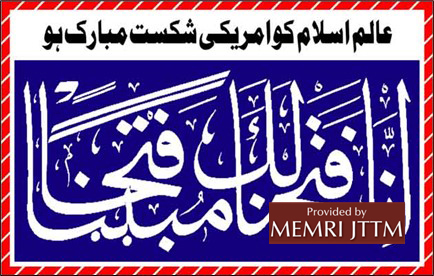
The Islamic Emirate has stood for a Sunni theocratic state in Afghanistan. It has never believed in sharing power with a democratically elected government. So, why did the Taliban agree to talks with the U.S. in Doha? First, the Taliban are a jihadi terror organization outlawed by the United Nations and perceived as such globally. They were desperately seeking international legitimacy, which talks with the U.S. accorded them. The talks elevated their status from that of a terror group to that of an international player talking to the superpower of the day.
Second, the Taliban had always refused to recognize the democratically elected government in Afghanistan. The Doha talks gave the terror group an unprecedented opportunity to appear overground and behave as if they were a government. The U.S. denied the Afghan government a seat at the talks. By talking to the Taliban, the U.S. delegitimized the democratic government of President Ashraf Ghani. For a jihadi group that never believed in democracy, this was a major victory.
Third, the Taliban entered the talks saying they wanted to remove the American occupation. Fourth, the Doha talks did not prevent them from continuing their terror attacks. Right through the talks and even after the agreement, the Taliban refused to agree to a ceasefire. Instead, the Taliban offered something like a “reduction in violence” that had no effect.[5]
Al-Qaeda’s And The Taliban’s Celebrations After The Doha Agreement
The Taliban saw the Doha agreement as a victory over America, and as a stepping-stone to achieving their larger goal of establishing a Sunni Islamic theocratic state in Afghanistan. On March 1, 2020, the day after the signing of the Doha pact, the front page of the pro-Taliban daily Roznama Ummat read: “Congratulations To The World Of Islam On American Defeat.”[6] On March 1, the Islamic Emirate’s Commission of Dawah And Irshad held a series of celebratory conferences in most of the districts of Afghan provinces, including in Paktia, Paktika, Kapisa, Baghlan, Parwan, Laghman, Badakhshan, and others to mark the U.S. defeat.[7]
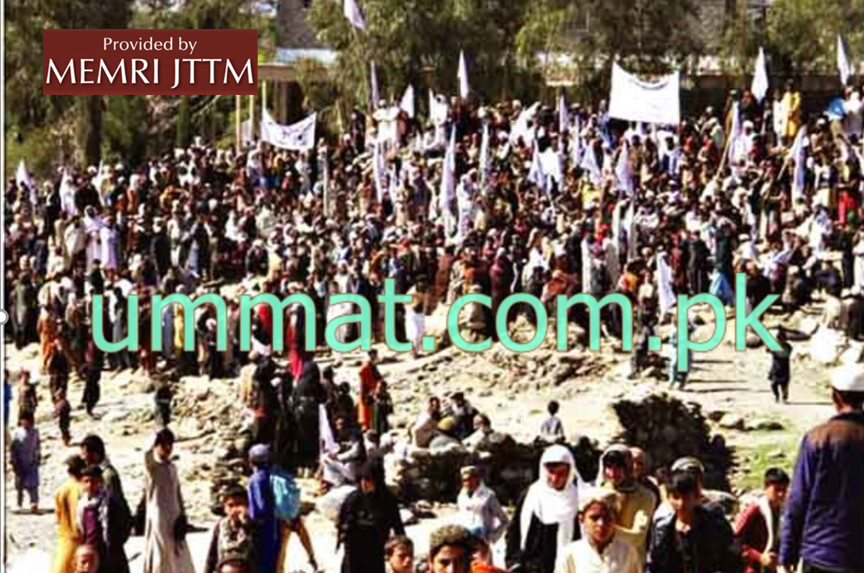
Al-Qaeda, which since the days of Osama bin Laden has formally pledged an oath of allegiance to the Taliban emir, also celebrated America’s “humiliating defeat.”[9] Mullah Haibatullah Akhundzada, the current emir of the Islamic Emirate, sacrificed ten sheep to mark the victory over America.[10] The elected Afghan government stood helpless. The Taliban leaders succeeded in convincing America that the enemy was not the Taliban jihadi organization, but the elected Afghan government. The pro-Taliban daily Roznama Ummat noted: “The Afghan Taliban have convinced America not to accept the current government.”[11]
President Ashraf Ghani heads the democratically elected government of Afghanistan, but he was totally side-lined and badgered by both the U.S. and the Taliban during the 18-month talks leading to the Doha agreement and, even after that, when he laid down a condition that the Taliban prisoners should be freed only after the a security check.[12] Ghani was forced to surrender, releasing the Taliban prisoners from Afghan jails, despite the state of Afghanistan having signed no such agreement with the Taliban, nor been part of the negotiations in Doha.
The Taliban, many of whose senior leaders still on a United Nations terror blacklist, engaged with the U.S. to gain legitimacy and undermine the democratically elected government of Afghanistan and used the opportunity to send in diplomatic missions from Doha to Iran, China, Indonesia, Uzbekistan, Russia, and other countries to gain international diplomatic legitimacy, while always working simultaneously to fight their way to Kabul through terror attacks in order to establish a theocratic government, the Sunni version of the Shi’ite theocratic regime in Iran.
The Taliban Strategy Before And After The Doha Agreement
Hanging Ghani – The Taliban Disclose Their Goal To Hang President Ashraf Ghani Like They Hanged Dr. Najibullah In 1996
The Islamic Emirate’s long-term goal has always been to establish a shari’a-based theocratic government. The strategy – tactically focused on seizing power in Kabul through terror attacks – was no different before, during, or after the talks in Doha. The Taliban conducted 915 terror attacks during the 30 days before the Doha pact, and 1,378 attacks during the 30 days after it was signed on February 29, 2020.[13] On March 1, the day after they signed the Doha agreement, the Taliban launched 74 terror attacks.[14]
Within just two weeks of the signing of the Doha agreement, it emerged that the Islamic Emirate had planned to fight its way to seizing power in Kabul by forcibly removing the elected government of President Ashraf Ghani. Roznama Ummat – the Urdu daily considered close to the Taliban – reported on March 12, just 13 days after the Doha pact, that “the Afghan Taliban have told the United States that it should withdraw all of its troops and not worry about saving Ashraf Ghani. We will not abide by any agreement with Ashraf Ghani [signed by the U.S.].”[15]
The Islamic Emirate even threatened to hang Ashraf Ghani like the mujahideen had hanged former Afghan President Dr. Mohammad Najibullah in 1996 when he was sheltered at the United Nations building in Kabul. An article in Roznama Ummat read: “The Haqqani Network [of the Islamic Emirate] fighters have begun preparations for occupation of Kabul…”; and if “the Leadership Council of the Afghan Taliban gives permission, the fighters of Haqqani Network will seize Kabul in 48 hours and Ashraf Ghani’s fate will be similar to that of Dr. Najib.”[16]
The Taliban plan to hang President Ashraf Ghani – first revealed by MEMRI in a mid-March 2020 report17] – was not some freak media exposure; it was repeated again in an article published officially by the Islamic Emirate in February 2021.[18] It stated: “The current conditions in our country are exactly the same again as then”: “God willing, the fate of every invader and slave will be the same as that of the Soviets and their slaves.”[19]
Within three months after the Doha agreement, Mullah Abdul Ghani Baradar Akhund, who had headed the Taliban delegation at the talks with the U.S., addressed a passing-out ceremony of suicide bombers in Afghanistan. A video, titled “Victorious Force” and released by the Taliban, showed statements “in honor of various martyrdom groups” made by Abdul Ghani Baradar Akhund; Sirajuddin Haqqani, the deputy emir of the Islamic Emirate and head of the Haqqani Network; Maulvi Mohammad Yaqub, the head of the Islamic Emirate’s Military Affairs Commission; and Zabihullah Mujahid, the Islamic Emirate’s spokesman.[20]
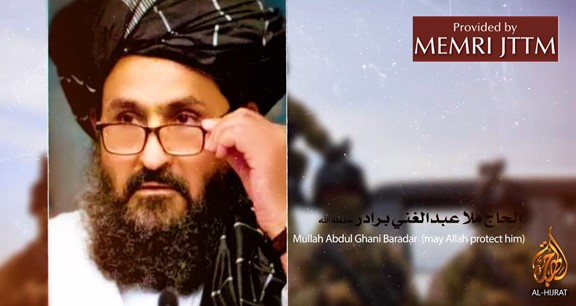
Right through the 18 months of talks and in the months after the Doha agreement, the Islamic Emirate continued to publicly release high-definition photos of the Taliban suicide bombers graduating from its training centers. Even in March 2021, when the U.S. began working toward the Istanbul conference, the Islamic Emirate released photos of “hundreds of mujahideen and martyrdom-seekers [i.e., suicide bombers]” that it had been training at three training camps located somewhere in Afghanistan: the Khalid bin Al-Waleed Camp, Al-Fateh Camp, and Hazrat Abu Bakr Siddique Camp.[21]
The Taliban have killed countless Afghan civilians and security forces. According to the Afghanistan Independent Human Rights Commission, 31,113 civilians were killed in the past 13 years. According to the Pentagon, the Taliban killed 43,074 Afghan civilians and 64,124 Afghan security force members. The United Nations Mission in Afghanistan (UNAMA) estimates that 41,622 civilians were killed between 2007 and 2020.[22] The Taliban never ceased fighting.
In June-July 2020, emboldened by their victory in Doha, the Taliban developed a plan to lay siege to Kabul. The pro-Taliban Roznama Ummat alleged in a report that it had been agreed between the U.S. and the Islamic Emirate that if there were no resolution to the Afghan problem through talks with the Afghan government, “the Afghan Taliban will want to lay siege to Kabul by force, and America will not oppose it and will describe it as an internal affair [of Afghanistan].”[23] This issue of the Taliban and the Afghan government failing to reach a resolution came up again in a Roznama Ummat report in October 2020 that alleged again that if no resolution as reached, it was agreed that the U.S. would hand over Kandahar, Bagram, and Jalalabad airbases to the Taliban – not to the Afghan army.[24]
In the 24 hours preceding September 27, 2020, marking the 24th anniversary of the Fall of Kabul in 1996 when the Taliban seized power, the Islamic Emirate, still celebrating its victory over America, launched terror attacks in 25 of the country’s 34 provinces. Fawad Aman, the deputy spokesman of the Afghan Defense Ministry, named the provinces in which the Taliban terror attacks took place: Nangarhar, Laghman, Kunar, Nuristan, Kapisa, Maidan Wardak, Ghazni, Logar, Paktia, Paktika, Khost, Kandahar, Zabul, Herat, Farah, Badghis, Ghor, Faryab, Sar-e-Pul, Balkh, Helmand, Kunduz, Badakhshan, and Baghlan.[25]
The ultimate goal behind this strategy of violence is to establish a Taliban-led Sunni theocratic government in Afghanistan, as existed in 1996-2001. Roughly seven months before the Doha agreement, the Islamic Emirate had developed a Plan B to form a government under Mullah Abdul Ghani Baradar Akhund, the Islamic Emirate’s deputy emir based in Qatar, in the Taliban-controlled areas of Afghanistan, which was to be “recognized by China, Russia, and Iran,” and presumably by Pakistan, the creator of the Taliban.[26]
The United Nations Report – The Full Incrimination Of The Afghan Taliban As A Terrorist Organization And Their Continuing Relationship With Al-Qaeda
Afghan Taliban Leaders “Met With Hamza Usama Muhammad Bin Laden… To Reassure Him Personally That The Islamic Emirate Would Not Break Its Historical Ties With Al-Qaeda For Any Price”
Under the Doha agreement, the Islamic Emirate agreed to “not allow any of its members, other individuals or groups, including Al-Qaeda, to use the soil of Afghanistan” and “not to cooperate with groups or individuals threatening the security of the United States and its allies,” and also pledged that it “will prevent them from recruiting, training, and fundraising and will not host them.”[27] However, it never abided by the terms of the Doha agreement.
Subsequently, Anas Haqqani, a leading commander of the Islamic Emirate brought to Doha amid the U.S.-Taliban negotiations, has urged the Taliban leaders to “keep your intentions concealed” and has stated: “A man should be determined in his heart to do what he wants, but he should not inform others.”[28] In fact, even when the Doha agreement was being signed, the Islamic Emirate was involved in active violations of these commitments.
A United Nations Security Council report revealed that the Islamic Emirate and Al-Qaeda were in active collaboration right through the U.S.-Taliban negotiations in Doha and after the signing of the agreement. The report, prepared by the UN Monitoring Team in mid-June 2020, noted: “Al-Qaeda and the Taliban held meetings over the course of 2019 and in early 2020 to discuss cooperation related to operational planning, training and the provision by the Taliban of safe havens for Al-Qaeda members inside Afghanistan.”[29]
The report further found: “Al-Qaeda is covertly active in 12 Afghan provinces [especially in the Taliban-controlled areas]: Badakhshan, Ghazni, Helmand, Khost, Kunar, Kunduz, Logar, Nangarhar, Nimruz, Nuristan, Paktiya and Zabul”; “Al-Qaeda leadership detailed in meetings with the Taliban have included Ahmad Al-Qatari…, Sheikh Abdul Rahman… Hassan Mesri (aka Abdul Rauf)… and Abu Osman… a Saudi Arabian member of Al-Qaeda.”[30]
The report further found: “The Monitoring Team was informed of six reported meetings between Al-Qaeda and Taliban senior leadership held over the past 12 months [a period during which Mullah Baradar was actively engaged in talks with U.S. in Doha]. The most notable of these was a meeting in spring 2019 that took place in Sarwan Qal’ah District of Helmand Province, at which Sadr Ibrahim, Mullah Mohammadzai… and former adviser to Mullah Mohammad Omar, Gul Agha Ishakzai… reportedly met with Hamza Usama Muhammad bin Laden… to reassure him personally that the Islamic Emirate would not break its historical ties with Al-Qaeda for any price.”[31]

The UN report further found: “[Al-Qaeda leader Ayman] Al-Zawahiri met with members of the [Taliban’s] Haqqani Network in February 2020 [when the U.S. was about to sign the Doha agreement]. Hafiz Azizuddin Haqqani… and Yahya Haqqani… consulted Al-Zawahiri over the agreement with the United States and the peace process. Yahya Haqqani has been the primary Haqqani Network focal point for liaison with Al-Qaeda since mid-2009.”[32]
The Taliban’s Goal: Waging Jihad To Establish A Theocratic Government
The Taliban’s celebrations continued for months after the Doha pact. In mid-March 2020, the Islamic Emirate published an official statement upholding jihad as its ideal. It stated: “It has now nearly been two weeks… yet this treaty is still being celebrated across the country in gatherings and the believing people are congratulating one another on this historic achievement.”[33] It added that the public celebrations have “validated the claim of the Islamic Emirate that has… continued armed jihad aimed at ending the [American] occupation”; “Our jihadi struggle against occupation – though ridiculed by the media over the course of eighteen years – has shown that the rational[e] and truth behind it was a shining light.”[34]
On the day the Doha agreement was signed, Mullah Haibatullah Akhundzada, emir of the Islamic Emirate, released a statement filmed and read by Mawlawi Amir Khan Muttaqi, a member of the Islamic Emirate’s Leadership Council. The Taliban emir emphasized the military and political strategy to be followed: “The mujahideen of the Islamic Emirate must further solidify, organize and bolster their ranks so that they can attain their objective of establishing an Islamic government…”[35] The strategy aimed at “preventing future unfortunate events, protecting Islamic government, maintaining combat readiness…”[36]
The current Constitution of Afghanistan was agreed upon by the Constitutional Loya Jirga (December 13, 2003 – January 4, 2004), which comprised more than 500 Afghan elders representing all sections of Afghan society. It was ratified by then president Hamid Karzai on January 26, 2004. Article One of the Afghan Constitution reads: “Afghanistan shall be an Islamic Republic…”[37] Article Two states: “The sacred religion of Islam is the religion of the Islamic Republic of Afghanistan. Followers of other faiths shall be free within the bounds of law in the exercise and performance of their religious rituals.”[38] These two definitions existing in the Afghan Constitution were not enough for the Taliban, who demanded a “pure Islamic” government.[39]
As part of and after the Doha agreement, the Afghan republic and the Taliban were supposed to hold intra-Afghan talks to agree to a transition of power that would have given the Taliban a share of power in Kabul. However, the Taliban laid down a condition that the country should have a new constitution enabling the formation of a “pure Islamic” government. On September 12, 2020, the opening day of intra-Afghan talks in Doha, Mullah Baradar Akhund, the Taliban’s deputy emir, told the delegates: “I urge both teams present in this gathering to give precedence to the higher interests of our sacred religion of Islam.”[40]
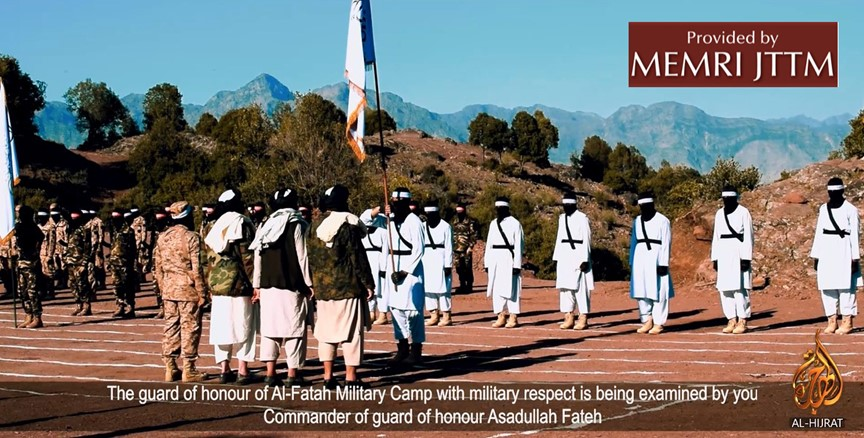
On September 11, 2020, a day before the intra-Afghan talks, the Islamic Emirate published an article that declared: “The Islamic Emirate of Afghanistan signed the Doha agreement to achieve the goals of its struggle – to end the foreign occupation and to establish a pure Islamic system of governance.”[41] It further said: “The Islamic Emirate of Afghanistan is engaging in the intra-Afghan talks to include every Afghan in the formation of an Islamic system… Intra-Afghan talks and the establishment of a real and pure Islamic system will bring peace in which the dignity of every citizen is protected.”[42]
On September 13, 2020, a day after the intra-Afghan talks began, the Islamic Emirate published an official statement that declared: “In our view, intra-Afghan negotiations can only succeed once all parties set their Islamic and national values as a barometer for resolving issues. Since these negotiations are among Afghans, they must be kept pure from all foreign meddling, ideologies, and values. Our own religious and national values that are already adopted by our people should not be sacrificed for foreign imported ideas.”[43]
The enforcement of Islamic shari’a in Afghanistan has always been on top of the Taliban’s agenda. In mid-June 2020, the Islamic Emirate, having signed the Doha deal about 100 days earlier, published a statement saying: “The Taliban’s objective is the enforcement of Islamic shari’a. The health system, women’s rights, education system, and the military will be shaped as per Islamic shari’a. The Taliban are in favor of giving more facilities for women’s education, but the Western democracy cannot become part of the system of Afghanistan.”[44]
In its September 20, 2020, statement marking the 24th anniversary of the Fall of Kabul, the Islamic Emirate had stressed the need for “a pure Islamic system” in Afghanistan, stating: “On this exact day [in 1996], a rule of such a pure Islamic system was established in our homeland, which was the aspiration and goal of half a million martyrs of our people.”[45] This shari’a-based position was justified two days later, on September 22, by Zabihullah Mujahid, spokesman of the Islamic Emirate: “Implementation of Islamic law during the complete rule of the Islamic Emirate [1996-2001] was a religiously binding obligation. Jurisprudence rulings are considered law in Islam that shall naturally be implemented in society…”[46]
Given the demands of the Taliban, it was no wonder that the intra-Afghan talks ran immediately into a deadlock over these issues. The Afghan republic’s team, comprising government officials and members of civil society organizations, defended women’s rights, democratic institutions, minority rights, especially those of the Shi’ite minority in Afghanistan. Whereas the Taliban rejected Western democracy and stood for a shari’a-based Sunni Hanafi system, which would be a Sunni theocratic version of the Shi’ite theocratic regime in which the government will be run by shura, the shari’a-based council of the Taliban leaders.
Afghan journalist Karim Amini summed up the reasons behind the deadlock: “The republic’s team has proposed that if a religious issue arises it can be solved based on Hanafi fiqh [jurisprudence] by default. However, the Shia Personal Status Law must be respected, and the choice of religious jurisprudence should be given to other minority groups as well.”[47] The Taliban did not agree to the republic’s proposal on Shia personal law.
The Taliban Spokesman Presents The Emirate’s Position On Jihad And On Islamic Punishments
“The Obligation Of Jihad Remains And Shall Continue… Until The ‘Word Of Allah’ Reigns Supreme”
The Taliban statements cited above make it clear that the Taliban reject democracy. In October 2020, seven months after the Doha agreement, Zabihullah Mujahid, the spokesman of the Islamic Emirate, clarified the Islamic Emirate’s positions on jihad and Islamic punishments, including outlining shari’a-based justifications for killing Muslims who support non-Muslims.
Mujahid stated in an interview: “The obligation of jihad remains and shall continue… until the ‘word of Allah’ reigns supreme, an Islamic government is established and the mujahideen and Afghans collectively feel a sense of assurance that their goal for which they sacrificed so much is achieved – but until such an outcome, jihad shall remain lawful and shall continue, Allah willing.”[48] He added: “[The] goal of jihad, which is the establishment of Islamic rule described as ‘raising the word of Allah’ in the books of Shari’a [Islamic jurisprudence], an objective that is yet to be attained. Therefore, until ‘raising the word of Allah’ reigns supreme on land and until the rule of Islam takes hold in our homeland, jihad continues to remain mandatory and Afghans [remain] obligated to wage jihad…”[49]
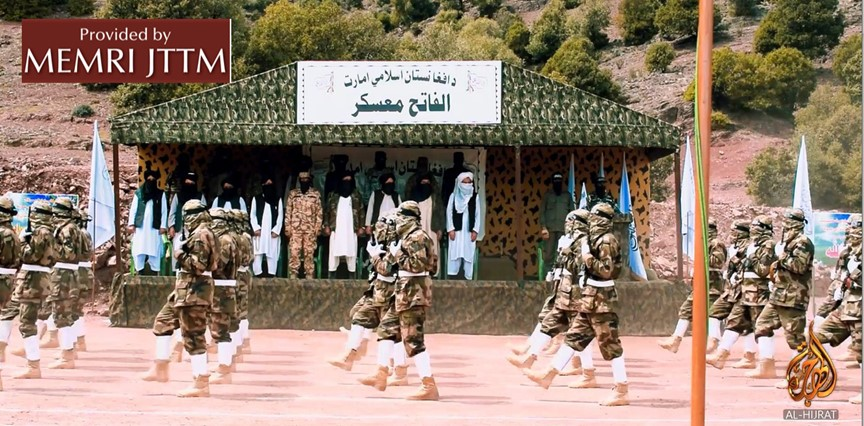
The Taliban spokesman explained a point whether Afghan Muslims who have aided Americans and other non-Muslims during the past two decades can be killed or not. Mujahid said: “A rule in an authoritative book of Hanafi jurisprudence, Fatawa Hindiyya, states: The oppressor and their backers who participate with them in oppression and corruption can be killed and the killer shall be rewarded immensely by Allah for killing the oppressors and the people of corruption. Now, is there any other greater corruption than aiding and supporting invaders?”[50]
Mujahid cited another source of Sunni jurisprudence: “One more subject found on page 250 of another authoritative book of jurisprudence, Fatawa Kamilya, states:… If unbelievers triumph and occupy a country, and a group of Muslims arise to help and support these infidels, begin killing Muslims, usurping their wealth, praise their (infidels’) goodwill, and begin aiding the… (infidels) against Muslims, then what is their ruling? The question is answered: It is absolutely clear that their ruling is the same as those… [for] the people of Darul Harb (land of war), the infidels, in a sense, that they shall be killed, and their wealth seized.”[51]
From 1996 to 2001, when the Taliban were in power, they administered punishments such as cutting off hands and stoning women. Mujahid’s interview makes it clear that Islamic shari’a has not changed. Mujahid said: “Another case is of a Muslim whom, God forbid, commits adultery and his crime is proven in a court of law, then such a person will face rajm [stoning] punishment. Even though he is a Muslim, yet he will still face the harshest forms of punishment by being stoned to death, because Islam has proscribed such for him.”[52]
The American Position: Pressuring The Democratically Elected Government To Ease A Terrorist Organization’s Power Grab
In early 2020, writing in Foreign Affairs magazine, then presidential candidate Joe Biden said he would restore democracies around the world and accused then U.S. president Donald Trump of having “emboldened our adversaries” from North Korea to Iran and Syria to Afghanistan.[53] Biden wrote: “Democracies – paralyzed by hyper partisanship, hobbled by corruption, weighed down by extreme inequality – are having a harder time delivering for their people. Trust in democratic institutions is down. Fear of the Other is up. And the international system that the United States so carefully constructed is coming apart…”[54]
“During my first year in office, the United States will organize and host a global Summit for Democracy to renew the spirit and shared purpose of the nations of the free world. It will bring together the world’s democracies to strengthen our democratic institutions, honestly confront nations that are backsliding, and forge a common agenda,” Biden wrote before he became president in January 2021.
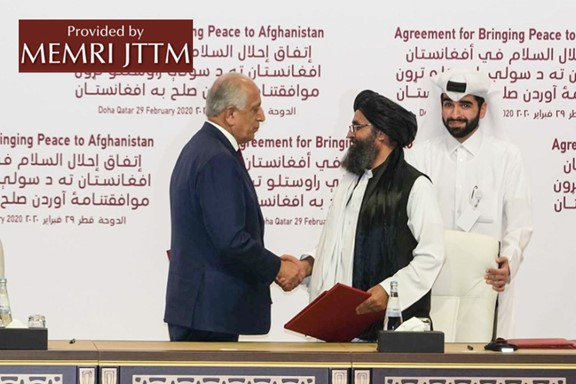
During the talks with the Taliban, the Trump administration stood firmly with the Taliban against the democratically elected Afghan government. There were hopes that in dealing with the Taliban, the new U.S. administration would uphold the democratic institutions established in Afghanistan over the past two decades, ensuring that democratic achievements such as women’s rights, a free press, and the rights of religious minorities would remain protected.
However, it appears that President Biden’s Afghan policy, being steered by the Trump-appointed U.S. Special Representative for Afghanistan Reconciliation Zalmay Khalilzad, is no different from the one pursued by his predecessor. It imperils the future of democracy in Afghanistan. If the U.S. stands for democracies and democratic institutions, there is simply no explanation for why the Biden administration would support the Istanbul conference in which: a) the current president will be removed three years before his term ends, b) the Taliban will be given power without participating in an election, c) a new religious constitution for Afghanistan would be initiated.
In March 2021, U.S. Secretary of State Antony J. Blinken wrote a letter to President Ashraf Ghani pushing proposals in favor of “Afghanistan’s future constitutional and governing arrangements” and “to build consensus on specific goals and objectives for negotiations with the Taliban about governance, power-sharing…”[55] Blinken’s letter was threatening in nature to the Afghan head of state by telling him bluntly “I must also make clear to you” and reminding him to understand “my tone.”[56]
Ahead of the Istanbul conference, a draft proposal being shared in Kabul presumably on behalf of the U.S. and which seems to be in line with Secretary Blinken’s letter, states: “[Transitional] Peace Government shall exist until it transfers power to a permanent Government following the adoption of a new constitution and national elections. This transfer of power shall occur no later than (xx) months from the date of this Agreement.”[57] If this agreement is signed in Istanbul, it will establish an interim transitional government with no limit to its term, thereby removing the democratically elected Afghan government mid-way and giving the Taliban a share of power without them having to participate in an election.[58]
Hence in the case of Afghanistan, America, the first democracy, is sacrificing an emerging democracy in favor of a jihadi terror organization as a cynical face-saving measure facilitating an American exit from Afghanistan and power grab by an Al-Qaeda ally.
